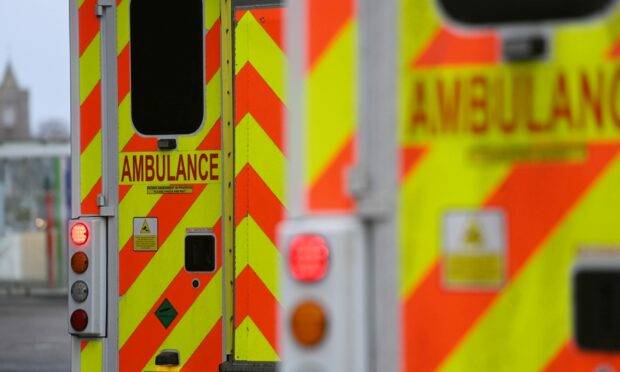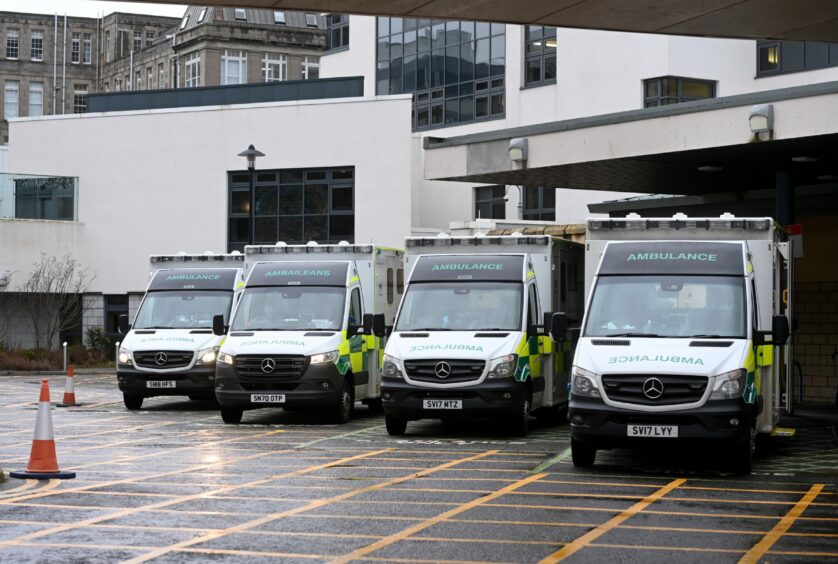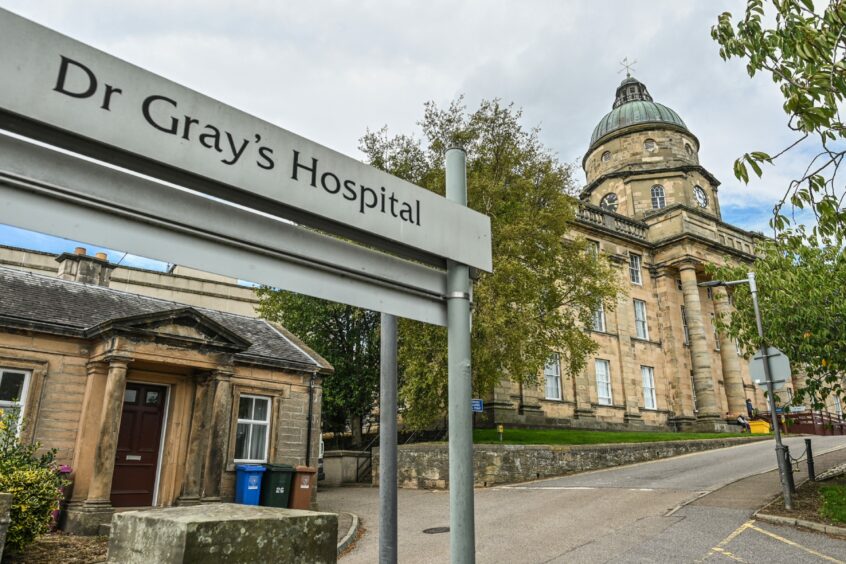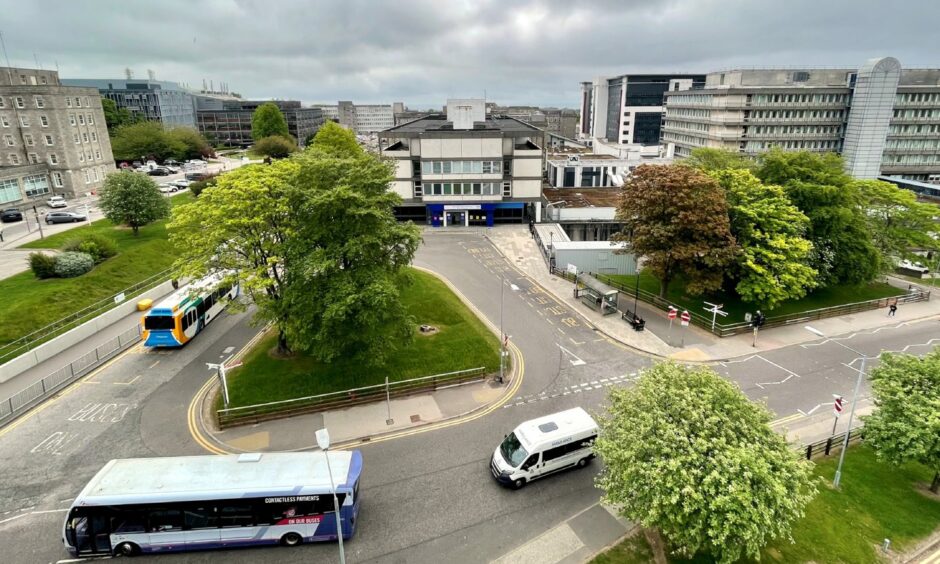A paramedic claims patients are at risk of harm left queuing outside the city hospital for up to eight hours in the back of ambulances.
The ambulance worker, who did not want to be identified, said patients face “horrendous” waits to be admitted to the Emergency Department in Aberdeen.
They can also spend up to eight hours queuing outside the assessment unit in ambulances if their health issue is not an emergency.
She said ill patients are even giving up waiting in the back of the vehicles and are leaving ambulances to make their own way home.
Long ambulance queues: ‘It’s just bonkers’
The paramedic said “exhausted” crews can spend the majority of their shifts waiting with patients in queues.
She said the problem started to get worse during the pandemic.
“Occasionally on a weekend nightshift we would potentially queue for maybe half an hour or so but we were never waiting in the ambulances before,” she said.
“They had spare beds in the corridor so we would get them cleaned and get our patients on them ready to move through to a bay.
“Whereas now you can turn up any time during the day and still have to queue – it’s just bonkers.”
‘You could be sitting with someone having a heart attack’
The paramedic highlighted concerns for patients and said ambulance crews were dealing with more seriously ill people than they did before.
“People are putting it off for as long as possible in the hope that they will get better and not have to go to the hospital but then they’re becoming more and more unwell,” she said.
Other patients, she claims, don’t even try calling their GP but phone for an ambulance, or help from NHS24, because they feel they’ll get a better response.
NHS Grampian stressed that every patient arriving at the Accident and Emergency department is triaged and seen in order of clinical priority.
A spokeswoman said ambulance crews can use a pre-alert process to inform staff in the department if there is any deterioration in a waiting patient’s condition.
But the paramedic says crews are concerned about the welfare of patients taken to hospital with the likes of suspected sepsis or chest pains.
“You could be sitting with somebody with chest pains in an ambulance who is actually having a heart attack but you don’t know it,” she says.
“And they say time is muscle with a heart attack. The longer it goes untreated, the more it can cause damage.
“Unless someone has had a stroke which is a time-critical illness, or has major traumatic injuries, or they’re near death, you don’t get in when you turn up at A&E – you join the queue, like everyone else.”
She said she had heard of patients dying while waiting in ambulances, although NHS Grampian said this had not happened.
‘We need to escort waiting patients to toilets’
The paramedic said patients waiting outside hospitals are left lying on narrow and uncomfortable stretchers for hours.
With no facilities in the back of ambulances, crews need to escort waiting patients into the toilet then back out to the vehicle again.
The situation can prove challenging with patients taken to hospital with broken legs sitting in long ambulance queues.
“We do get some patients who get very frustrated while they are in the ambulance waiting and occasionally patients will decide that they don’t want to be seen at the hospital anymore,” she said.
“Some of them just walk away from the ambulance – I don’t know how they get home.”
The paramedic said staff are facing multiple challenges which is making their job even harder. She claims:
- Ambulance workers can queue outside hospitals for the majority of their shift and can work 12 hours with no break
- Taxis are being booked to get nightshift workers from rural locations into the city hospital to swap with the day shift crew stuck in a queue
- Staff could face skill fade and students won’t get the same experience spending long hours in waiting ambulances
- During Covid, a cohorting system was introduced to allow some patients to wait in a hospital room but they don’t always get access to this
- Crews also face long waits outside Dr Gray’s Hospital in Elgin with more than 500 patients arriving at the Emergency Department there every week
You never know when you’re going to get your next meal or get to go home’
Local MSP Alexander Burnett says he’s “deeply worried” about the psychological impact the situation is having on ambulance workers.
The paramedic claims colleagues feel stressed and frustrated sitting in long ambulances queues and highlighted that some now want to change their careers.
“I’m very concerned,” she said. “Obviously we’re all in this job because we care about people and we want to help people get better.
“But it’s exhausting. You’re doing far more hours in a shift than you’re supposed to be doing and when you’re not getting your breaks on top of that it’s actually soul-destroying, sitting for hours and hours with patients.
“I’m thinking that I couldn’t possibly do this to retirement age if it continues this way; it’s just not sustainable.
“There’s only so much you can take of that workload and the stress.
“You never know when you’re going to eat your next meal; you never know when you’re going to get to a toilet and you never know when you’re going to get home to your family. It is hard.
“It feels like we’re fighting a losing battle.”
‘These cries for help should not be ignored’
Mr Burnett described health workers as good people doing the best work they could in “intolerable circumstances”.
He said: “Many people don’t fully appreciate the tightrope that our emergency services are walking into winter.
“Cries for help like this one, from the front line of patient care, cannot go unheeded.
“Last week Humza Yousaf apologised for the state of the NHS in Scotland.
“Beyond mere words, NHS Grampian and ARI need the SNP Government’s help to chart a path to safety. This is in the interest of patients as well as staff.”
No beds available in the wards
The Scottish Ambulance Service said they were working with colleagues at NHS Grampian to reduce wait times for ambulances.
But a spokeswoman added: “Hospital turnaround times continue to be a significant challenge across Scotland and are restricting our ability to get our crews back out responding to patients.”
NHS Grampian stressed that the recent Call Before You Convey system introduced had helped to reduce waiting times at the emergency department.
It’s a dedicated hotline that connects ambulance crews to consultants who decide if a patient needs hospital attention before they leave their house.
The health board said work was underway to make improvements with the system at ward 101 which faces challenges with demand for services.
A spokeswoman also insisted that facilities have been provided for crews to take breaks and get access to refreshments.
She said: “We aim to get people out of ambulances and into hospital as quickly and safely as we can.
“Neither we, nor Scottish Ambulance Service, wish to have vehicles waiting at Aberdeen Royal Infirmary or Dr Gray’s Hospital any longer than necessary.
“However, at extremely busy times, when we do not have beds available, we cannot bring patients in.
“We work extremely closely with Scottish Ambulance Service to manage this, with patient safety a priority at all times.”
A Scottish Government spokeswoman said £50 million had been invested in health services across the country to drive down waiting times.
She said: “Patient safety remains our top priority and long waits are not acceptable.”





